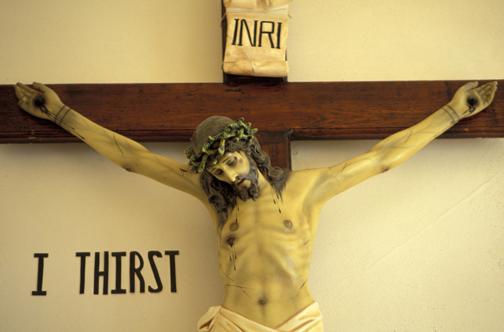Like the deer that yearns for running streams,
so my soul is yearning for you, my God.
My soul is thirsting for God, the God of my life;
when can I enter and see the face of God? [Psalm 42]
The Missionaries of Charity Sisters and Brothers (members of the Order founded by Blessed Teresa of Calcutta) describe themselves as 'walking contemplatives'. As part of the formation period for the Lay Missionaries of Charity I'm reading the book M.C. Train, which contains many letters by Fr. Sebastian Vazhakala, M.C. He explains that the Missionaries of Charity Brothers Contemplative spend several hours per day gazing upon Christ in the Eucharist and the rest of the day serving Christ in the poorest of the poor. Mother Teresa described the poorest of the poor as "Christ in his most distressing disguise". She believed that seeing Christ in the Eucharist (under the mysterious disguise of bread) would help the Brothers and Sisters of her Order to see Him more clearly in the poorest of the poor. Likewise, serving Christ in the poor would lead them to a closer union with Christ in the Eucharist. Through the Gifts of the Holy Spirit, we can come to see and adore God in all created things, especially in human beings who are created in His image and likeness.
In Three Ages of the Interior Life, Fr. Garrigou-Lagrange states: "to see God in souls is a grace that must be merited. It requires a particular clear perception which is gradually obtained by detachment from self and a more pure and strong love of God, which makes us discover those who love Him and those who are called to love Him, those from whom we can receive and those to whom we can and should give for love of Him."
In Three Ages of the Interior Life, Fr. Garrigou-Lagrange states: "to see God in souls is a grace that must be merited. It requires a particular clear perception which is gradually obtained by detachment from self and a more pure and strong love of God, which makes us discover those who love Him and those who are called to love Him, those from whom we can receive and those to whom we can and should give for love of Him."
The Catechism of the Catholic Church (2560) describes prayer as "the encounter of God's thirst with ours. God thirsts that we may thirst for him." Mother Teresa often spoke about Jesus' infinite thirst for souls. In some sense, the Missionaries of Charity vocation is founded on the words "I thirst" which Jesus spoke from the cross. Mother Teresa insisted that every Missionaries of Charity chapel would have these words placed next to the crucifix above the altar. The Missionaries of Charity refer to themselves as Victims of Love, as a reminder that they are willing to make any sacrifice necessary to bring souls (including their own) to closer union with God, thereby striving to quench Jesus' infinite thirst for souls. "These desires to satiate the longing of our Lord for the souls of the poor--for pure victims of His love, goes on increasing with every Mass and Holy Communion."
The Lord Jesus thirsts not only for us to bring other souls to Him, but he thirsts for each person individually. Mother Teresa heard his words "I thirst" as an expression of his yearning for union with each one of us, a yearning symbolized in the Song of Songs. Pope Benedict XVI explained in the encyclical Deus Caritas Est that God's love for his people is both passionate and selfless. "God is the absolute and ultimate source of all being; but this universal principle of creation—the Logos, primordial reason—is at the same time a lover with all the passion of a true love. Eros is thus supremely ennobled, yet at the same time it is so purified as to become one with agape." He is the Bridegroom and a lover to each and every one of us.
"Whoever has grown from infancy to manhood and attained to spiritual maturity possesses the mastery over his passions and the purity that makes it possible for him to receive the glory of the Spirit. He is that perfect dove upon whom the eyes of the bridegroom rest when he says: One alone is my dove, my perfect one."
--St. Gregory of Nyssa--
"Whoever has grown from infancy to manhood and attained to spiritual maturity possesses the mastery over his passions and the purity that makes it possible for him to receive the glory of the Spirit. He is that perfect dove upon whom the eyes of the bridegroom rest when he says: One alone is my dove, my perfect one."
--St. Gregory of Nyssa--
Sweet Lord, Thy thirst for souls,
I satiate with my burning love all for Thee,
my chalice will be filled with love,
sacrifices made all for Thee.
Ever more I will quench Thy thirst, Lord,
ever more I will quench Thy thirst, Lord, for souls,
in union with Mary our Queen,
I will quench Thy thirst.
